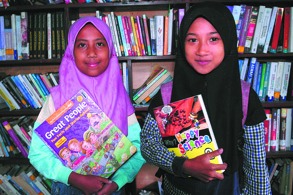Printed books are enjoying great popularity in the digital age – World

Last year, many Indonesian readers were shocked by the news that the 70-year-old bookstore chain Toko Gunung Agung was about to close all of its remaining stores. It felt like the death knell for the beloved print book.
The reality is much less bleak. Readership is actually growing outside the boundaries of conventional book distribution. The erosion of traditional systems is giving publishers the opportunity to be closer than ever to their most important stakeholder: the readers.
Avid book reader Gustra Adyana, a regular attendee of literary festivals, often brings home travel books after listening to their authors’ passionate accounts of an unforgettable journey.
“It’s more convincing when I can see the authors themselves and hear the discussions about the book,” says Gustra, who also heads the Indonesian program of the Ubud Writers & Readers Festival.
He regularly visits the video service portal TikTok, where his favorite authors give recommendations. “It’s not uncommon for me to buy books on TikTok. That’s why I don’t actually go to bookstores anymore.”
Visits to major bookstore chains showed that large parts of their stores have switched to selling stationery, school supplies, musical instruments and other goods, and books are taking up less space.
Publishers that rely heavily on traditional distribution chains are feeling the impact particularly hard as their industry is slow to recover from the pandemic.
“Before the pandemic, our minimum print run was 3,000 copies. Today it is 2,000. Also, we published six to ten titles per month, now it is a maximum of five titles per month. Now (since the pandemic) it is better, but we have not returned to our golden era,” said Ditta Sekar Campaka, Head of Marketing Communications at Noura Books.
“Books are living things,” says Windy Ariestanty of Patjarmerah, a mobile bookstore and literary festival, and publisher Indonesia Tera. “Accessibility is not just about giving people access to books. It’s also about books having the right to meet their readers.”
Bazaars, literary festivals, book clubs and author meetings are gaining importance nationwide as platforms for promoting and selling books, thus surpassing traditional bookstores.
When Windy launched the Patjarmerah literary festival in 2019, “dead stock” made up a large part of her collection.
“These ‘unsold’ books used to be in the dealer’s warehouse. But when we sold them at Patjarmerah, people responded positively,” she said. “Apparently, the people who read these books are not the kind of people who would go to a bookstore in a mall.”
The Ubud Writers & Readers Festival is now in its 20th year and welcomes 10,000 visitors each year, and the Makassar International Writers Festival is still a smash hit in its 13th year. Meanwhile, the local branch of Malaysia’s mega-fair Big Bad Wolf Books continues to attract readers and resellers until midnight in cities like Bandung and Balikpapan.
It is not only literature that has experienced a new relationship with its readers. Art books and zines as well as self-published works with limited editions are also experiencing a revival.
“If you compare our last three events in 2019, 2022 and 2023, there is growth in revenue, visitors and exhibitors,” said Januar Rianto of the Jakarta Art Book Fair.
“There are also more art book events these days, for example in Yogyakarta and Cirebon. Many zine festivals that started years ago and then took a break are also starting again.”
Online booksellers, each with their own communities, have also become an important sales channel.
“When the pandemic hit, new online booksellers were just emerging. You could say they were the ones who saved Indonesia’s publishing industry,” Windy said.
Although footfall in bookstores is declining, it is clear that people have not stopped buying and reading printed books. In fact, it is easier these days to find books that really appeal to you, as there is more choice in terms of titles, genres and distribution channels.
THE JAKARTA POST


